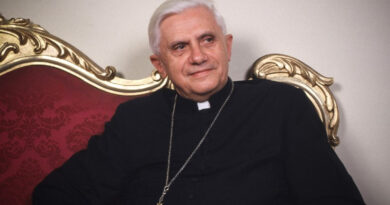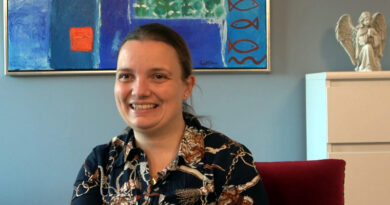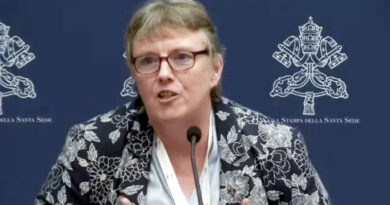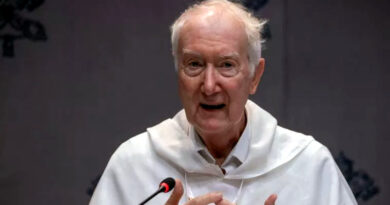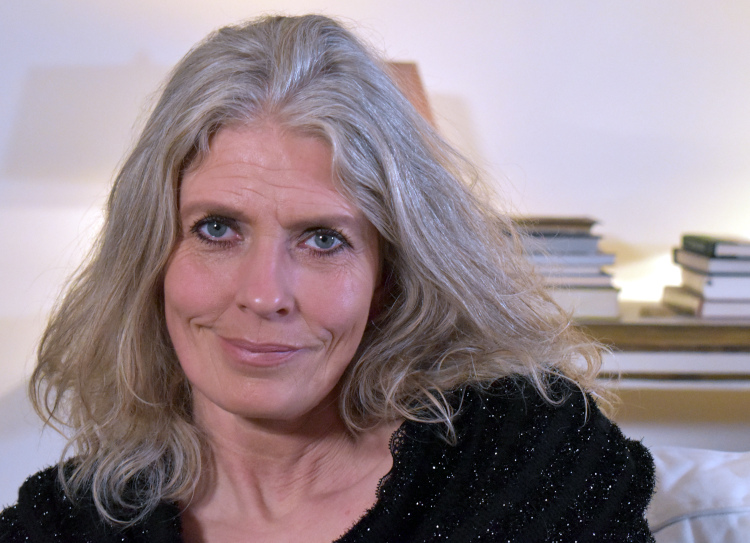
Overskrifter
Primate Wyszyński taught that God loves everyone and therefore every human being is endowed with immense dignity. Wyszyński spoke of holiness in everyday life, in the family, at work, and in relationships with loved ones. He also drew attention to the importance of communities, such as the Church and the nation. He was a forward-thinking man, committed to a religious and moral rebirth of society, which was achieved through his pastoral programmes included in the Jasna Góra Vows, the Great Novena and the Millennium celebrations of the Baptism of Poland. He chose the Mother of God as his model, to whom he entrusted himself entirely. Cardinal Wyszyński's texts and sermons often surprise us with their simplicity and accessible language, vivid examples and a sense of humour.
Beloved Children of God
"I am neither a politician nor a diplomat. I am neither an activist nor a reformer. But I am your spiritual father, your shepherd and bishop of your souls; I am an apostle of Jesus Christ", wrote Primate Wyszyński in a letter to the faithful of the Gniezno and Warsaw Archdiocese on the occasion of his installation as bishop in 1949. Proclaiming the Gospel and bringing the good news of God's love to every human being was the cornerstone of his ministry.
“Beloved Children of God!” was the signature opening phrase of his sermons. As Anna Rastawicka, one of the closest collaborators of Cardinal Wyszyński, emphasises, he tried to see every person as a beloved child of God. That was the source of his deep conviction about the great dignity of every person, irrespective of their background, views or moral standing. That is why he called for loving and forgiving enemies.
Many other important themes of the Primate's teaching stemmed from his deep Christian personalism and respect for the dignity of every human person. That is why he spoke so much about human rights and appealed to the authorities to respect them, defended life from conception to natural death, pointed out the dignity of the woman and the value of human labour. He cared a great deal about the moral renewal of the nation, convinced that it was a prerequisite for regaining spiritual freedom and by extension national freedom.
He explained that change must start with every single person. "Time is love! (...) Our whole life is worth as much as there is love in it," he pointed out.
“I have entrusted all to Mary”
Marian devotion was one of the pillars of Primate Wyszyński’s spirituality and teaching. He would often repeat: “I have entrusted all to Mary”. The Primate’s Marian devotion was Christological in character. Cardinal Wyszyński would always stress that “Mary’s role is to show us the path to Christ”.
He learned devotion to the Blessed Virgin Mary at home; it intensified after his mother’s death in 1910, when he was 9 years old. This premature departure of Wyszyński's mother impacted his relationship with the Mother of God, to whom he transferred his love.
The difficult years of internment from 25 September 1953 to 28 October 1956 were a time when Cardinal Primate became more devoted to the Virgin Mary. In his notes from that period, Marian themes constitute a significant part of his interests. On 8 December 1953, in Stoczek Warmiński, he made an act of personal dedication to the Mother of God, following the guidelines of St. Louis Grignion de Montfort. The latter’s spirituality contributed to Wyszyński’s idea of "slavery to the Blessed Virgin Mary". Complete trust in the Mother of God was the secret of the Primate's life and "the strategy of his episcopal ministry".
Cardinal Wyszyński appreciated the importance of popular piety with its distinct Marian traits. In spite of the criticism coming from many so-called “progressive Catholics”, he did not cut himself off from popular Marian sensitivity, but pointed out that a believer cannot be content with rites and feelings. He taught that true Marian devotion involved imitating the Mother of God, an arduous path that led even to the foot of the cross.
The Jasna Góra Vows of the Polish Nation, drafted by the Primate during his internment and taken by the Polish nation on 26 August 1956 in spiritual union with the still imprisoned Cardinal, were the most extensive programme of the moral renewal of society in the history of
Poland. The vows were to inspire Poles to work on themselves and to join efforts with the Blessed Virgin Mary to confront evil in their individual and social lives. Each year of the Great Novena, began on 3 May 1957 as a preparation for the celebrations of the Millennium of the Baptism of Poland, was dedicated to specific pledges of the Jasna Góra Vows. The novena was accompanied by a pilgrimage of a copy of the Icon of Our Lady of Częstochowa through Polish dioceses; the religious celebrations would gather tens of thousands.
Cardinal Wyszyński's Mariological reflection also enriched the Universal Church. He actively participated in the work of the Second Vatican Council, speaking e.g. on the text on Our Lady. In response to his request on behalf of the Polish bishops at the end of the third session of the Second Vatican Council, Pope Paul VI solemnly proclaimed Mary the Mother of the Church on 21 November 1964 and on 8 December 1975 entrusted the whole world to Mary.
Fr. Bronisław Piasecki, a former chaplain of Primate Wyszyński, recalls that the Cardinal had a “favourite image of the Blessed Virgin Mary, which he would always take on his trips. The Primate was seated in the rear of the car and Mary was in the passenger seat, right in front of him”.
The Primate was convinced of the special role of the shrine of Our Lady at Jasna Góra, which he called the "spiritual capital" of Poland. He spent there a total of over 600 days of his life. He also went on frequent pilgrimages to other Polish Marian sanctuaries, contributing to the development of Marian devotion.
Holiness in everyday life and through work
Cardinal Wyszyński, as Bishop Piotr Jarecki points out, was “an expert in the theology of earthly realities”. He indicated the importance of holiness in everyday life, of sanctification through simple, ordinary chores and duties, including professional work. In the 1930s, as a professor at the seminary in Włocławek and editor-in-chief of Ateneum Kapłańskie journal, Wyszyński was able to familiarize himself with issues concerning work. At that time, he led the Christian Workers' University and was a Church assistant to the Christian Trade Unions, which at that time were in opposition to socialist or communist unions.
His book The Spirit of Human Labour, published right after the war, is a clear and profound testament to the theology of work, a theme which was present in his thought and homiletics for many years. Interestingly, the founder of Opus Dei, St. Josemaria Escriva de Balaguer, knew this book and recommended it as valuable reading to those he was a spiritual director to. The saint was also instrumental in having the book translated into most European languages in 1957.
Wyszyński treated human work as an essential path to self-development, sanctification of the human being and of the world, and crucial for building a social community. He understood work not only as a kind of activity enabling one to earn one's living, but also in metaphysical terms. He related it directly to God, who created the world and who himself worked. He saw diligent work as a path to human development and self-improvement, as a path towards God and towards making the reality "more human". In short, he wanted humans to be shaped internally through work, to come closer to God and to others through it. He reminded us that work can also be prayer. He pointed out that through work "offered to God as a sacrifice, we partake in the salvific work of Jesus Christ, who by working with His own hands in Nazareth gave work a significant dignity".
He noted that without work man cannot "attain the full development of his personality". He explained that since human nature contains both material and spiritual elements, work cannot solely serve material progress, but involves "the development of the whole human person, and thus also spiritual progress". In short, work is also a path to holiness.
Human rights
The defence of fundamental human rights was one of the main themes of Fr. Wyszynski's teaching since the pre-war times. Speaking about human rights, Fr. Wyszynski consistently stressed that the human person should always be at the centre of attention and her or his rights should always have priority over any social structures. He noticed that every single human person had inalienable and unquestionable dignity and a whole set of rights arising from it. He argued that the primary duty of each state is to protect these rights.
In 1942, Fr. Wyszyński wrote, that "inviolable human rights are prior to and older than anyone else's rights, both those of the family, the nation and the state. They are independent of any social, economic or political system, and a system which would violate these goals will be unjust and slave-like".
In this respect, he was a forerunner in Catholic social teaching, which at that time did not deal directly with the problem of "human rights". Detachment from this notion as a legacy of the French Revolution prevailed. Fr. Wyszyński, discovering the significance of human rights at that time, placed himself in the avant-garde of the Church thought. His views can be said to have foreshadowed both the 1948 Universal Declaration of Human Rights and the further evolution of the Church's stance, ultimately adopted during the Second Vatican Council.
Cardinal Wyszyński argued that according to the principle of subsidiarity, the state is obliged to protect the rights of each citizen. He stressed that the citizen, who is a person, must not be treated as a means to achieve the aims of the state, but as an autonomous individual. Chief among the most fundamental human rights was according to him the right to life. "Every socalled right that gives anyone the ability to dispose of and determine human life is unlawful. Every act which seeks directly to destroy and to override the human right to life is a downright crime. Public authority has no such right! If anyone offered this right to us, such a ‘right’ must not be exercised. The exercise of such a right would be an assault on a fundamental human right and social integrity".
He also spoke of the right to universal education and an equal social start, the right to work and to a just wage, the right to have a say on one's family life (without excessive state interference), the right to enjoy cultural goods, and the right to peace.
An additional right, put forth by Wyszyński himself, was the "right to social love", which means that every person in social life should be treated not only fairly, but also with love and kindness. That is why another programme for the renewal of social life, undertaken immediately after the Millennium celebrations in 1967, a programme for the new millennium of faith, was the Social Crusade of Love.
It was these pillars that his radical criticism of the Communist ideology and system rested on. The ideology and the system reduced the individual to nothingness, violated their freedom, dignity, culture and spirituality, homogenised the society and disrupted fundamental social bonds.
Cardinal Primate contributed to the fact that the Church in Poland appeared at that time as an extraordinary phenomenon not only in the socialist countries, but also across Europe.
Respect for women
In his teaching he often spoke of the importance and dignity of women. He drew attention to the equality of women and men as Children of God. The starting point in his thinking about women was their humanity. Incidentally, it is worth recalling that Cardinal Wyszynski always stood up when a woman entered the room, regardless of whether she was simple or educated, young or old. He had great respect for women, whom he held in high esteem; most of the people he trusted were women.
He emphasised the importance of maternity but saw the vocation of women in a much broader context. He stressed that not all women had a call to family life, which should be respected. He greatly appreciated the spiritual and intellectual potential of women, convinced that God had endowed them very generously and that they should make use of it. He never disqualified women, never reduced their role to fulfilling household chores. He saw the value of what they contributed to society and to the life of the Church. He said that the social aspirations of contemporary women had to be properly understood and recognised by the Church and the clergy. As Dr Ewa Czaczkowska, Cardinal Wyszyński's biographer, points out, in the Primate's days more women worked in various commissions of the Polish Bishops' Conference than today.
It is worth recalling that the Primate also had interesting and concrete proposals for flexible social solutions, which recognised women’s role and made it possible to combine maternity with work outside the home. He always stood on the side of women and in their defence.
He was also aware of the importance of the pastoral care of women and their special spiritual needs. He repeated that the departure of men from the Church is not yet the greatest drama, but the departure of women is the ultimate catastrophe.
The Family
Cardinal Wyszyński's teaching about the family is one of the most important elements of his legacy. He saw the right to live in the family as one of the fundamental rights, inherent in human dignity. He saw the family as the home Church. At the same time, he saw it as the nation's greatest strength and a guarantee of its survival. In opposition to the communist state, which tried to destroy the tradition of the Christian family, the Primate fought for the wellbeing of the family. He insisted its rights be respected, pointing out the difficult living conditions of Polish families and the dangers of the prevailing ideology and law. Through his teaching, he even formulated something of a pro-family programme with specific economic and social demands.
At the same time, he pointed out the internal challenges to the family and called on believers to work on self-improvement. Through the Jasna Góra Vows of the Nation and the pastoral programme of the Great Novena, he taught about the need to defend life, about the need to care for the indissolubility of marriage, the dignity of women, and peace in families, about passing on faith and values to children and about fighting vices such as laziness, promiscuity, wastefulness, and especially drunkenness.
Forgiveness and reconciliation
After the death of Boleslaw Bierut, the communist president of Poland who had persecuted the Church, Cardinal Wyszynski immediately celebrated Holy Mass for his soul in the nuns' chapel in Komańcza. He did not hold a grudge against his enemies and those who persecuted him and tried to forgive them.
Cardinal Wyszyński was also one of the initiators of the famous message of the Polish bishops to the German bishops, which met with scathing criticism of the communist regime. At the end of the Second Vatican Council, a letter from the Polish bishops to the German bishops stated, among other things: "In this Christian and at the same time very humanitarian spirit, we extend to you our hands from the benches of the Council, which is drawing to an end. We grant forgiveness and ask for forgiveness". Although these words met with an almost hysterical rebuke from the communist authorities, they paved the way for a process of German-Polish reconciliation, one of the important factors that would enable the peaceful reintegration of Europe years later.
Spirituality of the nation
Primate Wyszyński was the creator of an original concept of the "'theology of the nation", based on the assumption that the nation is a natural community, just like the family; it is a specific "family of families" and a temporal vehicle of certain supernatural values. He understood the Baptism of Poland not only as the fact of baptising every Pole, but as a form of sacramental and spiritual transformation of the entire Polish community under the influence of the act of 966.
In Cardinal Wyszyński's thought, the Polish nation was inseparable from the Church. Cutting the nation off from the Christian tradition is like cutting a tree from its roots. The Primate was a great patriot, yet his patriotism was rooted in the awareness of universality of the Church and Christian unity. He rejected a patriotism marked by a dislike of and hostility towards others.
Cardinal Wyszyński was aware that he was the Primate of all Poland, that is, of all Poles, not only Catholics or those living in Poland. Speaking "in the name of the nation", he also defended the rights of non-Catholics and non-believers. Recognising in time that there was no political authority representing the interests of Poles, he assumed the role traditionally played by the Catholic Church during the Partitions or the wartime occupation. "I was not a politician, nor did I want to be one," he wrote. Yet, "in spite of my will I had to get involved in the affairs of both the Church and the Homeland".
Teaching about the spirituality of the nation was not merely theoretical. Leading the Church in Poland, the Primate guided the nation through important spiritual and collective experiences.
The greatest joy in the life of Cardinal Wyszyński was the election of Pope John Paul II. After his election to papacy, the latter observed: "Venerable, Beloved Primate! Let me simply say what I think. This Polish Pope, who today is full of the fear of God, but also full of confidence at the start of a new Pontificate, would not have been elected for the See of Peter, if it had not been for your faith, which did not shy away from prison and suffering, your heroic hope, your absolute trust in the Mother of the Church, if it had not been for Jasna Góra and this whole period of the history of the Church in our Homeland, which are connected with your episcopal ministry of the Primate.
Primate Stefan Wyszyński's life path was symbolically concluded with the words he spoke on his deathbed on 16 May 1981: "I am completely submissive to the will of the Father and the will of the Son, who alone has the eternal priesthood and assigns and conveys it to others. I am submissive to the Holy Spirit, because my interior life was in the Holy Trinity. And I am submissive to the Blessed Virgin Mary, to whom I entrusted everything when in prison at Stoczek, and I have offered everything through her hands for the glory of the Holy Trinity".
Maria Czerska, mp



